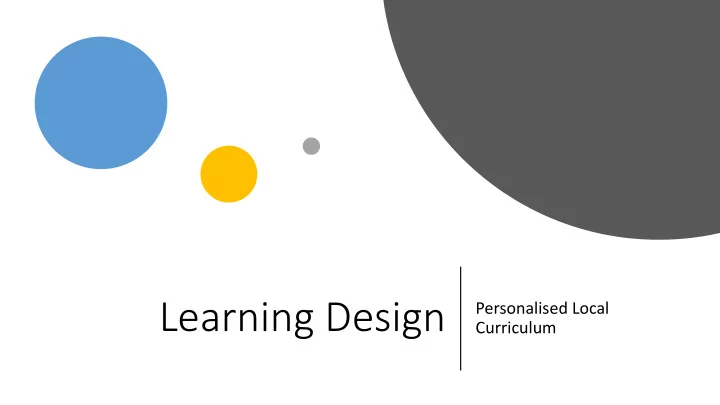

Learning Design Personalised Local Curriculum
Why did we need to do something different ? • Both schools had very different IEP systems • Our knowledge about effective practice has developed • Our collective experience and feedback from families told us that maybe we could do better • Accountability • Resource seeking • Placement decisions (Mitchell, Morton, Hornby 2010)
Why IEPs? • Accountability • Resource seeking • Placement decisions (Mitchell, Morton, Hornby 2010)
Is there consistency in IEPs across the school We asked ourselves
A review of the literature on Individual Education Plans found three major issues Report to New Zealand Ministry of Education , Mitchell, Morton, Hornby 2010) What the • The undue influence of behavioural psychology research says on IEPs • The over - emphasis on the individual • The unproven efficacy of IEPs
Finding research support for IEPs in Dempsey ( Finding promoting student’s progress is most difficult 2010) Australian Journal of Special Having an IEP is not guarantee of quality Education Having individualised instruciton
So why do people still • Accountability, accountability , accountability - systems, parents, schools strongly • Legislation - real and perceived advocate for • Special Education is different to other education the use of IEPs?
• Why do you think we have IEPs – What do you think are the gains and issues with IEPs as you have know them ? Discuss
How valuable was the existing IEP process – 3.6/5 What is the best part of the process ? 77% all responses notes hearing about progress and meeting the team Least helpful… Quality of the goals Lack of follow up Parent Survey
From one parent … • “Having to go first and say what the goals are. It would be more helpful if the teacher and therapists already know what the next steps are”
• If we had a blank slate and could design a system from scratch – what do we Our Guiding Inquiry think would great the greatest leverage for students learning ?
Developing our vision, values and beliefs Developed a model for how therapy will be delivered at CASS The Leavers Profile - 6 aspirations for students at CASS What we’ve Visited a number of schools with alternative curriculums been doing? Worked with Mary Chamberlain ( one of the designers of the New Zealand Curriculum ) on local curriculum design Identified the key components of the CASS curriculum Designing the systems that make up that model
Vision, Values and Beliefs
Therapy Model
The Leavers Profile - 6 aspirations for students at CASS
CASS curriculum model
Learner Portrait Home School Partnership Hauora Learning Plan Plan So what does this mean for families
Learner Portrait
Hauora Plan
• A way to share what is planned for the class that captures ALL of the learning • In all learning areas • For the class and for each student Curriculum • Recognises that learning doesn’t happen one thing at a time plan • Reflects direct instruction vs experiences and contexts • Might be different for different ages in the school
An example Learning Plan
Discussion – Partnership meetings • How often would you like to meet with you childs team ? • What would you like to see shared via Seesaw ? • What involvement should our students have in this process? • Are there considerations about the timings, meeting protocols, locations that you would like us to be aware of ?
Recommend
More recommend